Nootropics for Brain Fog: Which Supplements Actually Work?
Ever felt like your brain took a vacation without you? That’s brain fog; a state of mental confusion and forgetfulness. But fear not, because, amidst this cognitive fog, a glimmer of hope emerges: nootropics, a potential path to clear skies and sharpen thinking. Let’s check if indeed nootropics can help with brain fog!
But first things first!
What Does Brain Fog Feel Like?
Brain fog refers to a subjective feeling of ‘mental cloudiness‘. People experiencing brain fog often describe difficulty in concentrating, thinking clearly, and remembering things. It can feel like mental fatigue or haziness, making it hard to perform tasks that require focus and mental clarity.
Brain fog is not a medical condition in itself, but rather a group of symptoms of other conditions:
- Difficulty Concentrating: People experiencing brain fog often find it hard to focus on tasks.
- Memory Problems: Short-term memory can be affected, making it difficult to remember recent events or conversations.
- Lack of Mental Clarity: There’s often a sense of mental confusion, making it hard to think clearly.
- Fatigue: Feeling tired or having low energy levels is common, even after a good night’s sleep.
- Slow Thinking: Processing information can feel more challenging than usual.

What Causes Brain Fog?
- Sleep Deprivation: Not getting enough sleep can significantly contribute to brain fog.
- Stress: High levels of stress or chronic stress can impact cognitive functions.
- Diet: Poor diet, or specific food sensitivities, can affect mental clarity.
- Hormonal Changes: Fluctuations in hormones, such as during pregnancy or menopause, can induce brain fog.
- Medications: Certain medications can have side effects that include brain fog.
- Medical Conditions: Conditions like fibromyalgia, chronic fatigue syndrome, depression, and others are often associated with brain fog.
- Substance Use: Alcohol, drugs, and even caffeine (excessive use) can contribute to brain fog.
How can I clear my brain fog?
Improving sleep, managing stress, exercising, and maintaining a healthy diet can help. Staying hydrated is also important for overall brain health.
Still, you don’t remember where you put your keys last night, but you wanna be Einstein?
Well, it turns out there’s a colorful array of pills claiming to turn your brain into a turbocharged beast. These compounds are known as nootropics or smart drugs. Supplements that are claimed to have cognition-enhancing effects.

What are Nootropics?
Nootropics are a group of substances that can activate and improve cognitive functions including learning, thinking, memory, etc. [1]
There are several types of nootropics, ranging from dietary supplements to prescription drugs. The nootropic aisle has everything from caffeine (yeah, that’s right, your morning brew) and nicotine (yup, that stuff smokers love) to fancier-sounding substances like L-Theanine, and even prescription drugs like Modafinil.
What Can Nootropics Do?
Nootropics provide the following potential benefits among users;
- Improve memory
- Increase focus and attention
- Boost mental performance
- Provide neuroprotection
- Elevate mood
- Enhance creativity and problem-solving skills
Hell, they probably claim to make your coffee taste better too.

Some common over-the-counter nootropics are listed below;
- Caffeine: A stimulant found in coffee, tea, and energy drinks, known to improve alertness.
- Nicotine: Though commonly associated with tobacco, nicotine’s cognitive effects have been studied.
- L-Theanine: An amino acid found in tea, sometimes paired with caffeine for synergistic cognitive benefits.
- Omega-3 fatty acids: Known for their overall health benefits, these fatty acids may also impact brain function.
- Creatine: A popular supplement for bodybuilders, evidence suggests it may benefit cognitive abilities.
- Rhodiola Rosea: An herbal adaptogen with potential cognitive-enhancing properties.
- Piracetam: A synthetic compound often considered a pioneer among nootropics.
- Ginkgo Biloba: An herbal extract with potential memory-enhancing effects.
The Prescription Smart Drugs
Some nootropics are used to treat medical conditions and carry some risks of side effects and drug interactions. Therefore, you need a prescription from a doctor to buy them. These prescription nootropics include:
- Modafinil (Provigil): Originally designed to treat narcolepsy, it’s used off-label as a cognitive enhancer.
- Methylphenidate (Ritalin): Known for treating ADHD, it’s been studied for cognitive enhancement.
- Memantine (Axura): Primarily used for Alzheimer’s disease, it’s also explored for cognitive benefits.
- Amphetamines (Adderall): Used for ADHD, it’s known for increasing focus.
Nootropics for Brain Fog: Research-Based Evidence
Here’s where things get interesting. Some experts argue that the brain’s cognitive pathways are highly complex. They suggest that there’s no substantial evidence that any supplement can artificially boost cognitive functions. They support the idea that any effect of nootropics is a placebo effect: a mental Jedi mind trick. You believe they work, so they do.
But the evidence shows that THIS IS NOT THE CASE!
Many studies have been published in which research proves that the cognition-enhancing effects of nootropics are real.
Nootropic No.1: Nicotine
For example, several human studies have tested nicotine’s cognition-enhancing effects. Substantial improvements in attention and working memory are associated with nicotine use. [3] For instance, a research study has demonstrated that people who eat nicotine-chewing gums have better handwriting speed and fluidity. It suggests nicotine’s potential role in improving the brain’s fine psychomotor functions. [4]
This what many smokers are usually experience. They need a cigarette to maintain their focus. And it’s hard for them to focus when they try to quit smoking.
However, nicotine is addictive. Definitely, it’s not suggested as a supplement to use for brain fog!
Nootropic No.2: Combination of L-theanine and Caffeine
In another study, scientists found that the L-theanine supplements in conjunction with caffeine, led to a remarkable enhancement in focus and alertness. Notably, the participants exhibited heightened accuracy during cognitive tasks compared to those in the control group.
The combination is popular in nootropic supplements due to its synergistic effects and relatively low risk of side effects when taken in moderate amounts. Indeed the combination of these two is one of the most well-established smart mixtures. And the thing is you can experience the cognitive results immediately after using them.
Why Caffeine and L-theanine Work Together?
Caffeine is a stimulant that primarily works by blocking adenosine receptors in the brain. Adenosine is a neurotransmitter that promotes sleep and relaxation; thus, blocking its receptors leads to increased alertness and wakefulness. In this way, caffeine stimulates the central nervous system, and hence it improves focus and concentration. On the downside though it can also cause jitteriness, anxiety, and restlessness.
L-theanine is an amino acid found in tea leaves. It is known for its ability to promote relaxation without causing drowsiness. L-theanine is thought to increase levels of certain neurotransmitters (a mixture of GABA, serotonin, and dopamine), which contribute to its calming effect. In addition, it has been shown to reduce stress responses.
Now, imagine the combination of caffeine and L-theanine. Caffeine provides the stimulating effects needed for increased alertness and attention, while L-theanine helps to smooth out the potential over-stimulation from caffeine, reducing side effects like jitteriness. This combo balances out the intensity of caffeine, helping you stay locked into tasks without the distraction of restlessness.
The combination is reported to improve both speed and accuracy of performance in attention-switching tasks and reduce susceptibility to distractions.
How to Take L-theanine and Caffeine?
The best way to have this mixture is a cup of green tea. Green tea contains both caffeine and L-theanine and it will give you this sense of calm alertness you are looking for.
However, if you are something like me, and your morning coffee is the best part of your day, then you should consider taking L-theanine through supplementation. This will ensure that you don’t sacrifice your lovely morning coffee, with its all-antioxidant effects. But, most importantly, you will ensure that you are consuming the proper amount of L-theanine to take advantage of all its benefits.
Here is the one that I personally used today to write this beautiful craft:
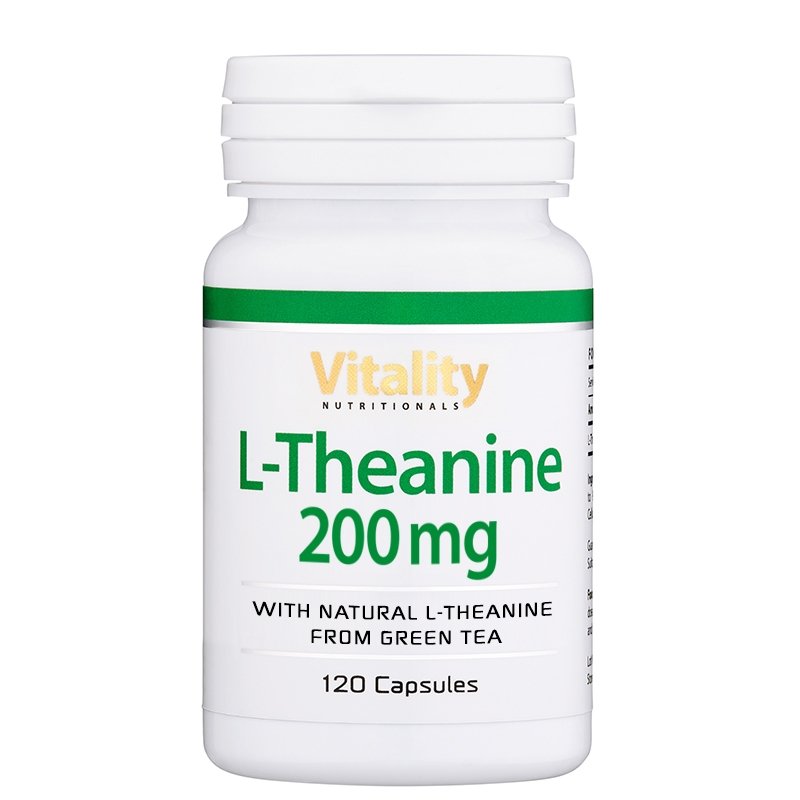
When: In the morning before coffee, or whenever you are supposed to need to be more focused. Remember slipping L-theanin in before your coffee could be the zen moment your jacked-up nerves need.
Dosage: The sweet spot usually hovers around 100 to 200 milligrams per day. Hence, 1 capsule of the above product per day would the perfect.
Nootropic No.3: Creatine
Creatine, an amino acid supplement commonly used by bodybuilders to boost muscle growth, has also been beneficial for the brain. After analyzing six randomized controlled trials involving 281 healthy individuals, a systemic review has determined that creatine supplementation can enhance short-term memory and reasoning abilities in people. [5]
Moreover, it seems to prevent mental fatigue which is something that every busy person faces daily. So, imagine you’re gearing up for a mental marathon – a day packed with meetings, brainstorming sessions, and tasks that demand your A-game.
That’s where creatine comes into play, and trust me, it’s not just for pumping iron at the gym.
Creatine as a Mental Boost
Let me explain the scientific aspect of it. Creatine aids in the production of adenosine triphosphate (ATP), which is the energy source for your cells. When ATP levels are increased, your brain cells function efficiently, resulting in quick thinking and mental toughness. Pretty simple, right?
Where can I find creatine, you wondered. Well, creatine is actually a naturally occurring compound found in certain foods. Pork, poultry, fish, and especially red meat are the main sources of it in the diet.
Of course, your body isn’t just sitting around twiddling its thumbs waiting for steak to come by. It’s quite the creator too! Our liver, kidneys, and pancreas whip up this compound using amino acids (arginine, glycine, and methionine). The only thing is that this production is not enough, you need to consume certain amounts of creatine to reap the benefits of it.
Here’s the good news:
You don’t have to go caveman-style with pounds of steak to get the benefits of creatine. You can take it in supplement form, which makes it easy to add to your daily routine. If you’re someone like me who exercises regularly, you can enjoy the mental and physical benefits of creatine. So, in addition to mental benefits, it can help you produce more energy, increase the water content of your muscles, improve high-intensity performance, speed up muscle growth, and more. [6, 7, 8]
Creatine for me is one of the must-supplements. I use it consistently. I might stop for 2-3 months per year, and then, back again. So, always drink lots of water when in use, and take a 2-3 months break per year (not needed but just to be on the safe side) and you can enjoy one of the most beneficial supplements with very low risk.
Vitamin Express has a high-quality Creapure Creatine which we recommend!
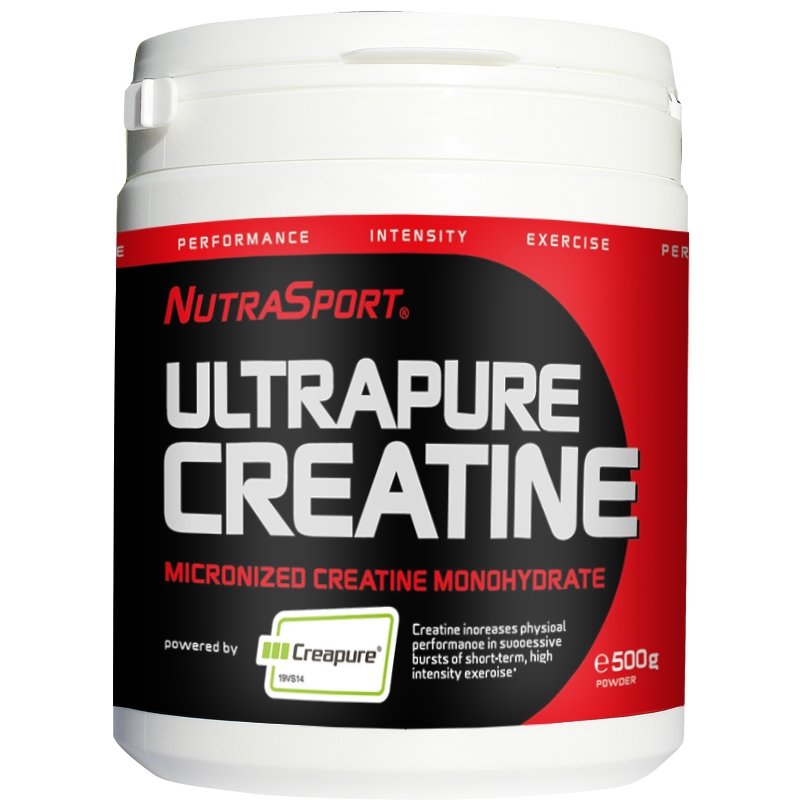
When: There is no specific time to use it for better results because any way you need to take it for 2-3 weeks to start noticing the results. However, I usually consume creatine post-workout along with my protein powder just because is more convenient. Because, in the end, we want to make our life easier not harder, so convenience is a significant factor.
Dosage: 5 grams per day is the proper dosage for long-term use.
Dosage form: Choose what is more convenient for you. As I already told you, I mixed 5 grams of powder along with my protein powder, and voilà the proper post-workout drink.
Super important: You should always look for Creapure! Creapure is the gold standard, ultra-pure, high-quality creatine monohydrate! Hence, whatever brand choose, check for the Creapure sign.
Nootropic No.4: Herbal extracts
The nootropic effects of herbal extracts, ginkgo biloba, Rhodiola, etc., have also been tested for a long time. For instance, a study showed that the use of ginkgo biloba for six weeks significantly improved memory and neurocognitive functions in old adults, as observed by an increased speed of processing and recalling abilities in the subjects during various cognitive tasks. [9, 10]
Nootropics No.5: Taurine
We have already discussed taurine’s huge potential in our recent post: Taurine for Mind and Body? In summary, we can say that among others taurine:
- Acts as a neurotransmitter, facilitating communication between neurons. It also shields neurons from damage and promotes their survival.
- Improves cognitive function, memory, and learning abilities by enhancing synaptic plasticity and supporting the growth of new neurons.
- It helps regulate neurotransmitters involved in mood regulation, reducing anxiety, and stress. It even has probable antidepressant effects!
Indeed, taurine is a very interesting compound. Even though it has been associated with energy drinks, taurine it’s much more than this!
This amino acid is naturally produced within our bodies, primarily in the liver and the brain but it can also be obtained through various dietary sources. Meats such as beef, pork, and poultry contain significant amounts of taurine, with higher concentrations found in organ meats like liver and heart. Seafood is another excellent source of it.
In general, though, supplementation of taurine is usually suggested to hit the beneficial levels of it within your body.
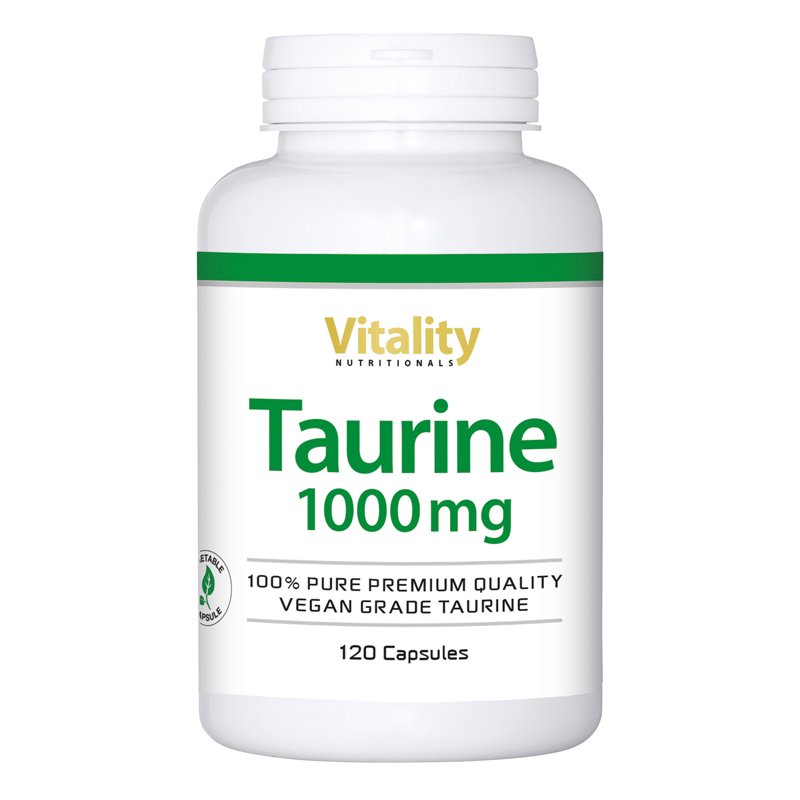
When: Always before your mental marathon. When is the hardest part of the day? In the morning or maybe you have consecutive important appointments in the afternoon? Choose wisely!
Dosage: In general, it’s suggested to take up to 2000mg. We suggest keeping it moderate. There is no reason for overuse. So the recommended capsule of 1000mg is the proper choice; 1 capsule per day.
Nootropic: Omega-3 fatty acids
Last but not least the Omega-3 fatty acids. Omega-3 fatty acids are well-researched and now there is indisputable evidence for their benefits in humans. A scientific review that was held in 2022 had the following conclusion: “Consumption of omega-3 improved learning, memory ability, cognitive well-being, and blood flow in the brain. Omega-3 therapies are beneficial, well-tolerated, and very low-risk. Omega-3 therapies are beneficial, well-tolerated, and very low-risk.”
Mental Benefits of Omega-3
Indeed, polyunsaturated fatty acids are recognized for their potential health benefits. But now the evidence is getting even better because we recognize their several mental benefits:
- Enhances cognitive function and memory
- Supports mood regulation and emotional well-being
- Reduces inflammation in the brain, promoting optimal function
- Aids in maintaining healthy brain structure and neuron communication
- Potential protective effects against age-related cognitive decline
- Supports focus and attention, crucial for mental tasks
- It may alleviate symptoms of anxiety and depression
- Boosts overall brain health, contributing to long-term cognitive vitality
Omega-3 is the No.1 supplement everyone should take!
If I had to use only 1 one supplement, this would be Omega-3 for dozens of reasons.
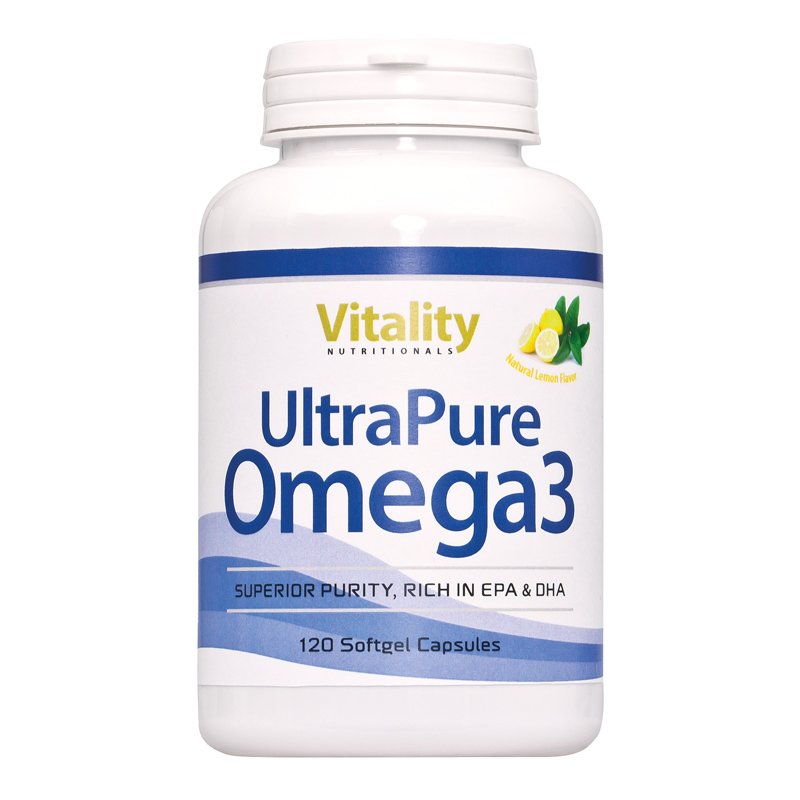
When: Hard to decide, we suggest one of the below though:
- With Meals: Accompany omega-3 with your food to facilitate smoother digestion and their effective absorbance.
- Spread Throughout the Day: Divvy up doses to keep a steady omega-3 flow in your body.
- Before Bed: Anecdotal evidence that this can lead to smoother sleep.
Dosage: You should always shoot for 1500 – 2000 mg of omega-3 fatty acids per day from all sources. So, depending on your diet, you need 1-2 of the above capsules per day. For instance, on the days that I consume a big meal of fish, I skip any polyunsaturated fatty acid supplementation, while on other days, when my meals do not have any omega-3 sources (fatty fish, seeds, nuts, etc.) I might go for 2 capsules.
Nootropics for Brain Fog: The mechanisms
Brain fog can be caused by various factors, including stress, lack of sleep, poor nutrition, and even certain medical conditions. Therefore, first, we have to point out that brain fog can be faced with just a better lifestyle. Stick to your sleep schedule, exercise daily, chill out a little bit, and stop buying cookies! These might be enough to sharpen your brain!
Nevertheless, nootropics can help you with brain fog or at least give you this extra spark you are looking for.
While research on their effectiveness is ongoing, some people use nootropics to alleviate brain fog, which is characterized by confusion, lack of clarity, and difficulty concentrating.
The Mechanisms of Smart Drugs:
Nootropics are thought to help with brain fog through several potential mechanisms:[1, 11]
- Increased Neurotransmitters: Some nootropics increase the synthesis, release, and uptake of neurotransmitters like acetylcholine, dopamine, serotonin, etc. This function plays an essential role in mood regulation, memory control, and other cognitive processes in the brain. Especially when it comes to memory and cognitive function, acetylcholine is the target neurotransmitter. That’s why nootropics like Alpha-GPC and CDP-Choline will help you with brain fog. They are choline sources which is an essential nutrient and a building block of acetylcholine.
- Improved Blood Flow: Certain nootropics may enhance blood flow to the brain, increasing the supply of oxygen and nutrients necessary for optimal cognitive function.
- Neuroprotection: Some nootropics have antioxidant properties that might protect brain cells from oxidative stress and improve overall brain health.
- Enhanced Brain Plasticity: Nootropics might support neuroplasticity, which is the brain’s ability to reorganize and form new connections. This could help improve cognitive flexibility and learning.
- Reduced Inflammation: Chronic inflammation is linked to cognitive impairments. Some nootropics could have anti-inflammatory effects that might alleviate brain fog.
- Stress Reduction: Nootropics might have anxiolytic (anti-anxiety) effects, potentially helping to reduce stress and promote mental clarity.
Are Nootropics Safe?
Although data are limited on the long-term safety of nootropics, the current evidence suggests that these drugs and supplements are safe and well-tolerated. Side effects of nootropics are uncommon, and they rarely cause any serious problems. [1, 11]
However, the safety of nootropics is a complex topic that depends on various factors such as the type of nootropic, the dosage, and individual health. So, understanding these elements is key to determining their overall safety.
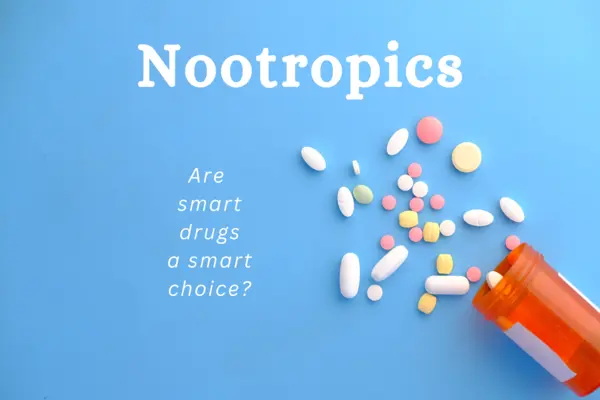
Prescription nootropics, which are typically used to treat conditions like ADHD, narcolepsy, or Alzheimer’s disease, are generally safe when prescribed by a healthcare professional and used as directed. However, their safety profile changes when they are used for purposes other than their approved medical use.
On the other hand, over-the-counter supplements seem to be safe when used in moderation. However, the supplement industry is not as rigorously regulated. Unfortunately, the Quality of supplements is not as ensured yet as in pharmaceuticals. That’s why we always suggest finding a brand that you trust for your supplements. Otherwise, you might harm your body or just load your liver with extra work!
Natural nootropics, like caffeine and L-theanine, are widely considered safe for most people when consumed in moderation.
Furthermore, the safety evidence of newer synthetic compounds is limited. This lack of comprehensive data makes it challenging to fully ascertain their safety profiles. As such, the long-term effects of many nootropics remain a subject of ongoing research. Always keep that in mind when you consider your supplements.
It’s also important to consider individual variability in the use of nootropics. People can respond differently to these substances based on their unique health conditions, physiology, and genetic makeup. As a result, a nootropic that is safe for one person may not be so for another.
Advise Your Physician!
Of course, when it comes to supplementation it’s always better to advise your physician before making any additions to your diet. Also, always stop the supplementation when a symptom arises!
Some adverse outcomes may include individual intolerance, headache, irritability, sleep problems, increased libido, digestive discomfort, etc.
Finally, nootropics are contraindicated in lactation, pregnancy, and hypersensitivity.
Takeaway
Nootropics have the potential ability to improve the brain’s cognitive functions, including learning, thinking, memory, etc. Substantial evidence in the literature proves the cognition-enhancing effects of nootropics.
Also, it is safe to use these nootropics, but a medical consultation should be taken before using them.
And always remember: Yes, nootropics will help you with brain fog. Nootropics will improve your memory, sharpen your thinking, etc. But first, prioritize a healthy lifestyle. Nothing can substitute good sleep, exercise, balanced nutrition, low stress, and all these that we frequently discuss here!
Thanks for reading!
Disclaimer: The article contains affiliate links, which means that if you purchase something after clicking on this link, we’ll probably earn a few bucks from it. However, keep in mind that we suggest only products that we use and deserve our recommendation. This is the only way you can support our efforts to stay on track for seeking a better life, backed by science. But, please advise your physician before you make any adjustments to your diet and or supplementation.
If you make it so far, then you need to follow us on social media.
Stay tuned!
References
- Malík M, Tlustoš P. Nootropics as cognitive enhancers: types, dosage and side effects of smart drugs.
- Giesbrecht T, Rycroft JA, Rowson MJ, De Bruin EA. The combination of L-theanine and caffeine improves cognitive performance and increases subjective alertness.
- Valentine G, Sofuoglu M. Cognitive effects of nicotine: recent progress.
- Tucha O, Lange KW. Effects of nicotine chewing gum on a real-life motor task: a kinematic analysis of handwriting movements in smokers and non-smokers.
- Avgerinos KI, Spyrou N, Bougioukas KI, Kapogiannis D. Effects of creatine supplementation on cognitive function of healthy individuals: A systematic review of randomized controlled trials.
- S. L. Nissen and R. L. Sharp, Effect of dietary supplements on lean mass and strength gains with resistance exercise: a meta-analysis.
- R. B. Kreider, Effects of creatine supplementation on performance and training adaptations.
- T. W. Buford et al., International Society of Sports Nutrition position stand: creatine supplementation and exercise.
- Mix JA, Crews Jr WD. An examination of the efficacy of Ginkgo biloba extract EGb 761 on the neuropsychologic functioning of cognitively intact older adults.
- Kaschel R. Specific memory effects of Ginkgo biloba extract EGb 761 in middle-aged healthy volunteers.
- N. A. Suliman, C. N. Mat Taib CN, et al., Establishing natural nootropics: recent molecular enhancement influenced by natural nootropic.
- I. M. Dighriri et al., Effects of Omega-3 Polyunsaturated Fatty Acids on Brain Functions: A Systematic Review.


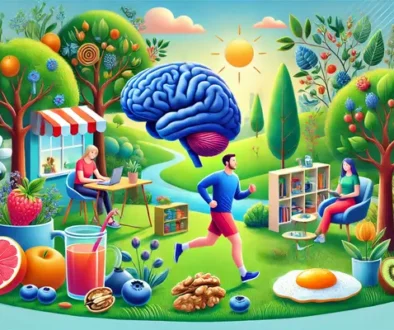

Low Magnesium Mental Symptoms: What Reddit Won't Tell You!
November 5, 2023 @ 2:39 pm
[…] Kind reminder: Always advise your physician before you make any adjustments to your diet and or supplementation. […]
Dr. Kojo Sarfo Book: Feeling Good! A Mental Health Workbook
November 14, 2023 @ 4:58 pm
[…] Also read: Nootropics for Brain Fog: Which Supplements Actually Work? […]